mardi, 29 septembre 2020
Escalation in Nagorno-Karabakh: The Eurasian perspective
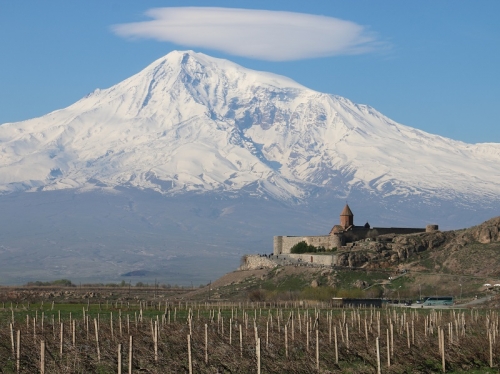
Escalation in Nagorno-Karabakh: The Eurasian perspective
On September 27, a new round of escalation of the conflict in Nagorno-Karabakh began. As the Azerbaijani Defense Ministry reported, in response to shelling Azerbaijani villages with artillery and mortars from Armenian side, the country's army launched a counteroffensive operation. It is reported that Azerbaijani troops have moved deep into the territories controlled by Armenian formations and seized a number of settlements.
Martial law has been introduced in Armenia and general mobilization has been announced. The Armenian side accuses the Azerbaijani military of shelling populated areas. In turn, Baku claims that the authorities of Armenia and the unrecognized NKP (Nagorno-Karabakh Republic) themselves put the civilian population at risk.
President of Azerbaijan Ilham Aliyev addressed the people of the country and expressed readiness to finally put an end to the Nagorno-Karabakh problem.
The current aggravation of the military conflict in Nagorno-Karabakh is the most acute since the "four-day war" in April 2016, when Azerbaijan managed to regain up to 20 square kilometers of territory along the line of contact with Armenian troops.
The roots of the conflict
The conflict in Nagorno-Karabakh has been going on since the late 1980s. Traditionally, for at least the last 100 years, relations between the Armenian and Azerbaijani communities in Transcaucasia have been strained during periods of weakening the geopolitical power that held control over the region. It was so during the Armenian-Azerbajani massacres of 1905-1906, that coincided with the First Russian Revolution and during the Civil War in Russia.
The era of Perestroika led to the renewal of centrifugal tendencies and the blossoming of both Azerbaijani (Turkic) and Armenian nationalisms. The very idea of building nation-states in the region, where both peoples historically lived intermittently as part of empires, could not but lead to a war accompanied by ethnic cleansing.
Specifically in Nagorno-Karabakh, the Armenian community proclaimed the creation of its own state with the prospect of joining Armenia. As a result, a war broke out that ended with the signing of an armistice in 1994. Azerbaijanis were expelled from Nagorno-Karabakh. In turn, almost the entire Armenian community of Azerbaijan also left the country.
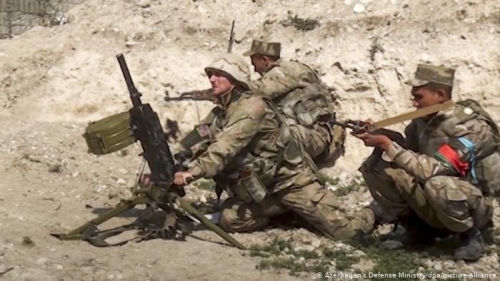
Now the only diplomatic format for conflict resolution is the OSCE Minsk Group, co-chaired by Russia, USA and France.
At the same time, all peace initiatives have reached a deadlock. Over the past 10 years the so-called "Kazan formula" has been discussed in the expert community, and since 2016 the so-called "Lavrov plan": Russia's proposals to start de-escalation of the conflict.
The "Kazan formula" referred to Armenia's exchange of the seven occupied districts of Azerbaijan around Nagorno-Karabakh for the end of the economic blockade by Baku. These seven districts make up the so-called Nagorno-Karabakh Security Belt, where there is virtually no population. The second initiative concerned five of the seven districts, leaving the unrecognized NKP to have a land corridor for communication with Armenia.
However, as pro-Western politician Nikol Pashinyan came to power in Yerevan after colored revolution, the Armenian side refused this compromise.
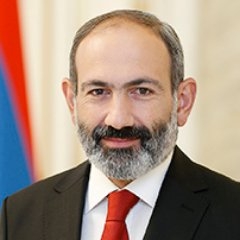 Pashinyan's factor
Pashinyan's factor
In 2018, a liberal politician Nikol Pashinyan became the Prime Minister of Armenia. Previously, he was a member of parliament from the "Yolk" bloc, which advocated Armenia's withdrawal from the structures of the Eurasian economic integration.
The new Prime Minister of Armenia took a double stance on Nagorno-Karabakh. On the one hand, he provoked Azerbaijan by advocating direct negotiations between Stepanakert and Baku, which the Azerbaijani authorities could not do. On the other hand, he entered into a political conflict with the NKP leadership related to the Armenian leader Serzh Sargsyan, who was deposed in Yerevan in 2018 as a result of protests.
Pashinyan also entered into a conflict with the Armenian Diaspora in Russia, initiating criminal proceedings against his political opponents. One of them was the former president of Armenia and the first president of the unrecognized NKP, Robert Kocharyan, who when he had been the leader of the country had established good personal ties with Vladimir Putin. At the same time, representatives of Western liberal foundations and NGOs came to Armenia's governing structures under Pashinyan.
It is possible that this factor also played a role in Azerbaijan's decision to solve the Nagorno-Karabakh problem by force: Pashinyan refused to compromise, while complicating relations with Russia. Baku may well have thought that Moscow would not stand up for Pashinyan, who has accumulated many questions.
The Turkish factor
For a long time, the Nagorno-Karabakh conflict remained a time-bound mine that could blow up the region. The reason why the Nagorno-Karabakh conflict is so important is that major regional powers may be drawn into it, primarily Russia (on Armenia's side as a CSTO ally) and Turkey (as a traditional ally of Azerbaijan).
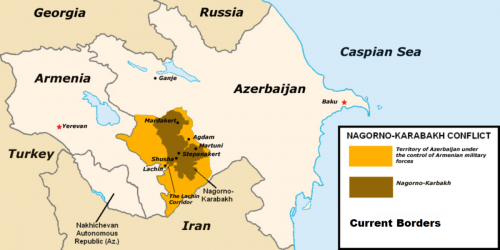
Turkey, represented by President Recep Tayyip Erdogan and numerous officials has already announced full support of Azerbaijan by all possible means. After clashes on the Armenian-Azerbaijani border in July 2020, Ankara and Baku held a series of joint exercises, including near the border with Armenia.
The foreign and Russian media reported on the possible transfer of pro-Turkish fighters from Syria to Azerbaijan ("Sultan Murad Division"). Besides Syria itself, Turkish private military company SADAT uses this contingent in the Libyan campaign. Armenian Ambassador to Russia Vardan Toganyan also accused Ankara of sending 4 thousand militants to Azerbaijan.
If the reports about Syrian fighters are at least partly true, Ankara's activity in the Karabakh direction may be due not only to the desire to help the "brothers" of Azerbaijanis, but also to pressure Russia near its borders to make concessions both in Syrian and Libyan directions.
However, Turkey's large-scale involvement in the conflict contradicts Ankara's objective geopolitical interests.
The prospect of a clash with Russia collapses the complex system of negotiations and force balancing that Moscow and Ankara have been building in recent years. Despite the tactical contradictions and support of various parties in specific conflicts in Syria and Libya, this system has effectively isolated other players, primarily Western countries led by the United States. According to the Western think tanks, Turkey and Russia have become the main forces in Syria and Libya.
Economic and energy projects, primarily "Turk Stream", are also mutually beneficial for Russia and Turkey. On the contrary, it is important for Washington to undermine this project as well as “Nord Stream-2”.
If Ankara is dragged into an open conflict with Moscow over Nagorno-Karabakh, Turkey will find itself in a situation similar to that of the Russian Su-24 in November 2015. It will lose an important partner, but it will not get the appreciation of the West (especially given the activity of the Armenian lobby in the United States and European countries).
Atlanticist trap
Russia maintains allied relations with Armenia, and the only Russian military base in Transcaucasia is now located in Armenia - in Gyumri. However, Azerbaijan is Russia’s important geopolitical and economic partner. Moscow is least interested in a large-scale conflict in the region.
Moreover, whatever position it takes if the conflict turns into a full-scale war, Russia is in a position of a loser.
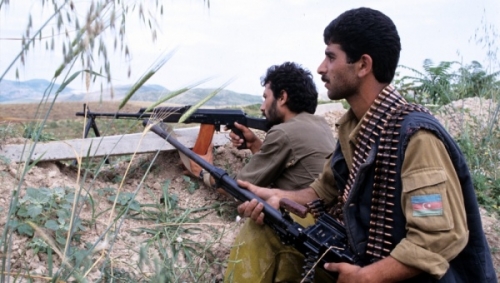
If Moscow supports Yerevan in the conflict, it will lose Azerbaijan and the North-South Corridor project, which should connect Russia with Iran and India, will collapse. NATO bases could emerge in the Caspian Sea.
Refusal to support Yerevan threatens Armenia's withdrawal from Eurasian integration structures. In that case, the Russian military will have to leave Armenia and the Americans will take their place. Armenia's neighborhood with Iran is an additional motivating factor.
Turkey's possible protests do not count, as the Americans have already had experience of being in Syria, near the Turkish birders, supporting the anti-Turkish Kurdish forces, that Ankara considers terrorist. And such a hostile behavior did not lead to the serious consequences for the American side.
Finally, we cannot rule out the possibility of American or European "peacekeepers" appearing in the conflict zone.
It is the Atlantic Pole that benefits from the large-scale war in the region from extra-regional forces.
It is in the U.S. interests to turn Russia and Turkey against each other. The Americans are interested in two forces challenging the unipolar world order to fight each other, not against the US hegemony. Diverting attention from both Russians and Turks to Nagorno Karabakh will allow Americans to dramatically increase their influence in Syria, Libya, the Eastern Mediterranean as a whole, and other regions where Moscow and Ankara have become visible.
It is indicative that activation of the conflict in Nagorno-Karabakh coincided with other strikes of the Atlantists in the "Great War of Continents": riots in Belarus and pressure on Germany to abandon the "Nord Stream-2" ("Poisoning of Alexei Navalny ").
It is in the interest of the Eurasian Geopolitical Pole to do everything so that the scenario of Atlantic revenge does not materialize and the conflict is ended as soon as possible.
At that, a goal should be set to eliminate all networks of Atlantic influence in the region, both in Armenia and Azerbaijan, as well as in Russia and Turkey. Interference of extra-regional forces into the conflict should be stopped.
The OSCE Minsk Group has proven to be completely unsuitable. It serves as a tool to legitimize American and European interference in the region. The choice of the co-chairmen of the group based on the principle of representing the world's largest Armenian Diasporas is also doubtful. This causes Azerbaijan's distrust.
Besides Armenia and Azerbaijan, the conflict directly affects such powers as Russia, Iran and Turkey. In Syria, these three powers were able to implement a more effective negotiation mechanism - the Astana format, which significantly reduced the destructive influence of the West and the Persian Gulf countries. It is time to talk about the Astana format on Nagorno Karabakh issue.
11:45 Publié dans Actualité, Affaires européennes, Géopolitique | Lien permanent | Commentaires (0) | Tags : actualité, caucase, eurpe, affaires européennes, politique internationale, géopolitique, nagorno-karabakh, arménie, azerbaïdjan |  |
|  del.icio.us |
del.icio.us |  |
|  Digg |
Digg | ![]() Facebook
Facebook



Les commentaires sont fermés.